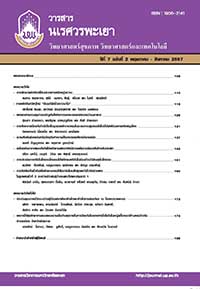ผลการให้สุขศึกษาตามแบบแผนความเชื่อด้านสุขภาพในการป้องกันโรคขาดสารไอโอดีนในหญิงตั้งครรภ์ตำบลแม่ข้าวต้ม อำเภอเมือง จังหวัดเชียงราย
Keywords:
ผลการให้สุขศึกษา, แบบแผนความเชื่อด้านสุขภาพ, การป้องกันโรคขาดสารไอโอดีน, Intervention program, health belief model, prevention of iodine deficiencyAbstract
การวิจัยครั้งนี้ เป็นการวิจัยแบบกึ่งทดลอง แบบกลุ่มเดียววัดก่อนและหลังการทดลอง มุ่งศึกษาผลการให้สุขศึกษาความรู้ ความเชื่อด้านสุขภาพ และพฤติกรรมการป้องกันโรคขาดสารไอโอดีน ในหญิงตั้งครรภ์ กลุ่มตัวอย่างได้จากการเลือกแบบเฉพาะเจาะจง จำนวน 30 คน โดยใช้แบบแผนการให้สุขศึกษา แบบทดสอบก่อน และหลังการให้สุขศึกษา 7 สัปดาห์ เครื่องมือที่ใช้ในการวิจัยคือ แบบสอบถามที่ผู้วิจัยสร้างขึ้นและได้ตรวจสอบคุณภาพอยู่ในเกณฑ์ที่ยอมรับได้ วิเคราะห์ข้อมูลด้วยสถิติ ร้อยละ ค่าเฉลี่ย ส่วนเบี่ยงเบนมาตรฐาน และการทดสอบค่าที (t-test)
ผลการวิจัยพบว่าภายหลังการทดลองในหญิงตั้งครรภ์กลุ่มตัวอย่าง มีปัจจัยด้านคุณลักษณะบุคคล ได้แก่ ความรู้เกี่ยวกับโรคขาดสารไอโอดีน การรับรู้โอกาสเสี่ยงต่อการเกิดโรคขาดสารไอโอดีน การรับรู้ความรุนแรงของโรคขาดสารไอโอดีน การรับรู้ประโยชน์ของการป้องกันโรคขาดสารไอโอดีน การรับรู้อุปสรรคในการปฏิบัติการป้องกันโรคขาดสารไอโอดีน และพฤติกรรมการป้องกันโรคขาดสารไอโอดีน สูงกว่าก่อนการการทดลองอย่างมีนัยสำคัญทางสถิติที่ .01 จากผลการวิจัยนี้แสดงให้เห็นว่า สุขศึกษาตามแบบแผนความเชื่อด้านสุขภาพในการป้องกันโรคขาดสารไอโอดีน สามารถนำไปใช้ได้ย่างมีประสิทธิผล
Effectiveness of health education based on health belief model for preventing iodine deficiency in Ma Kaw Tom, Muang District, Chiangrai Province
Thiwathip Sanmuang1, Benjawan Nunthachai2 and Sanhawat Chaiwong2*
1 Ma Kaw Tom Health Promotion Hospital, Muang District, Chiangrai Province 57100
2 Faculty of Health Science, Nation University, Lampang Province 52000
3 Environmental Health Branch Public Health, Department School of Medicine, University of Phayao, Phayao Province 56000
Iodine deficiency in pregnant women affects the embryo causing an intellectual quotients disorder. The study aimed to compare the knowledge, the health belief model (severity perception, susceptibility perception, benefits perception and barrier perception), and the behavior of before and after intervention. The quasi experiment was designed for 30 pregnant women who live in Mae Kaw Tom sub district from January, 2012 to March, 2012. The subjects were the perspective sampling. The questionnaire was constructed based on the 1974 Health Belief Model (HBM)’s Becker theory. The intervention program included pre - test and post - test measurements on subjects within 7 weeks. The statistical analysis was; 1) The percentage, mean, and standard deviation were used in terms of descriptive statistics and 2) The Pair t – test was used for analytical statistics.
The results showed that the post - test of knowledge, health belief model (severity perception, susceptibility perception, benefits perception and barrier perception), and behavior in regards to iodine deficiency prevention was higher than post - test and demonstrated statistically significant differences. Thus, the intervention program affected the subjects positively for preventing the iodine deficiency disorder in pregnant women.
Downloads
Published
How to Cite
Issue
Section
License
ผู้นิพนธ์ต้องรับผิดชอบข้อความในบทนิพนธ์ของตน มหาวิทยาลัยพะเยาไม่จำเป็นต้องเห็นด้วยกับบทความที่ตีพิมพ์เสมอไป ผู้สนใจสามารถคัดลอก และนำไปใช้ได้ แต่จะต้องขออนุมัติเจ้าของ และได้รับการอนุมัติเป็นลายลักษณ์อักษรก่อน พร้อมกับมีการอ้างอิงและกล่าวคำขอบคุณให้ถูกต้องด้วย
The authors are themselves responsible for their contents. Signed articles may not always reflect the opinion of University of Phayao. The articles can be reproduced and reprinted, provided that permission is given by the authors and acknowledgement must be given.








